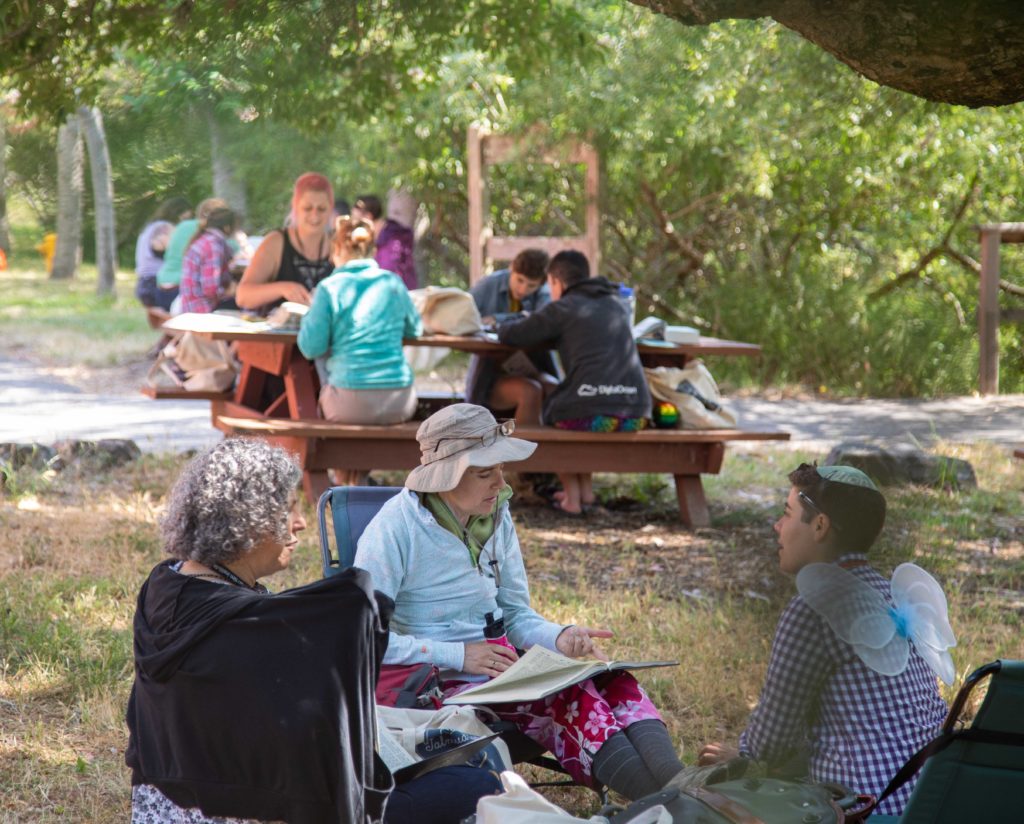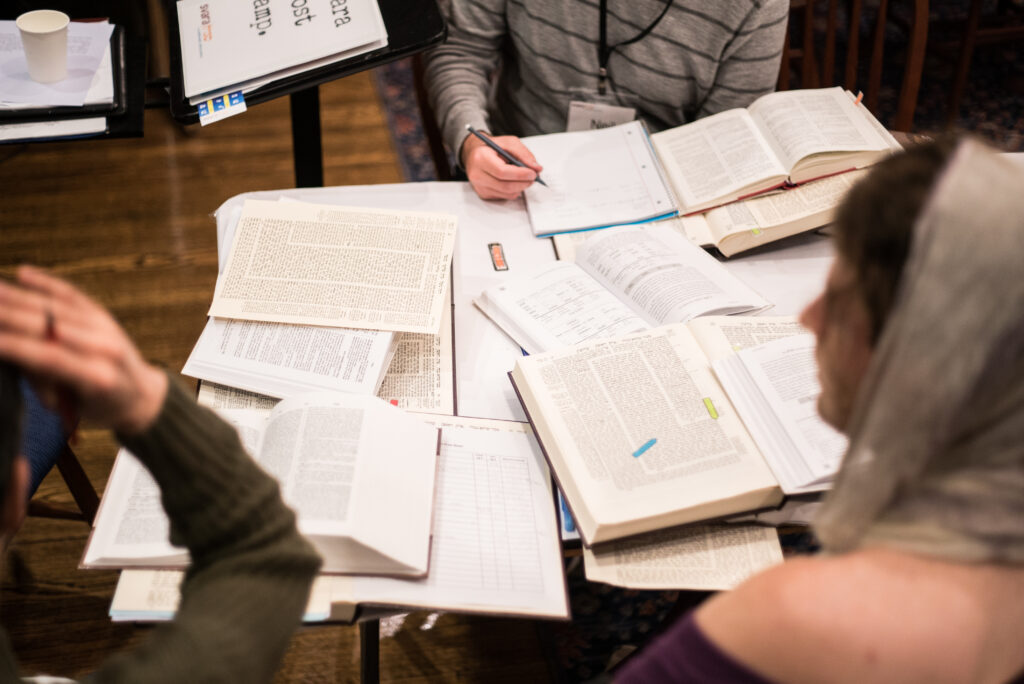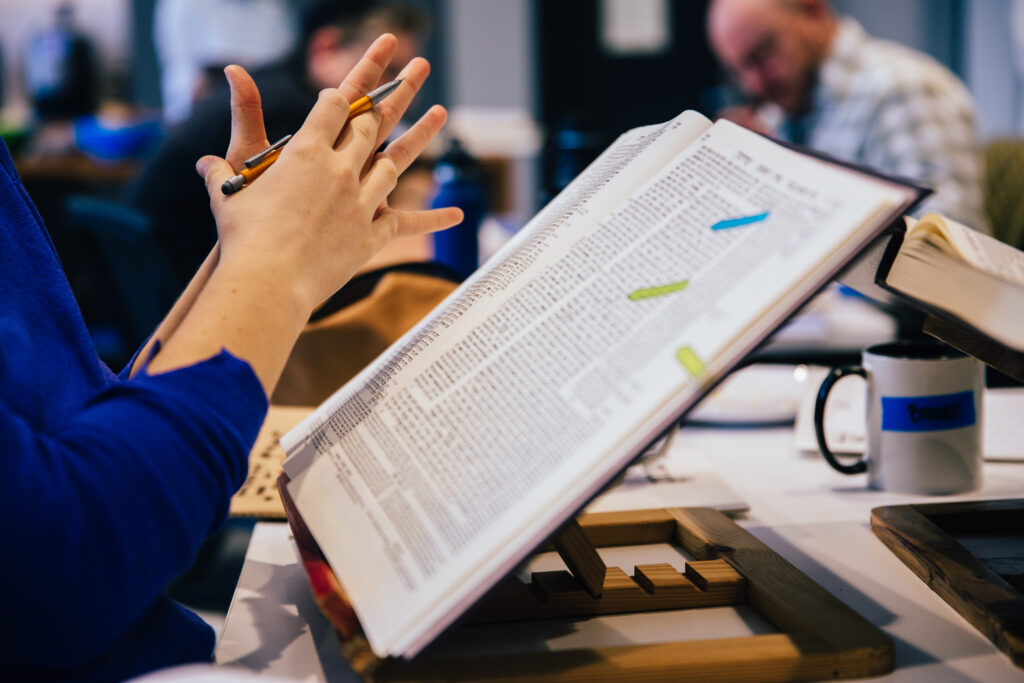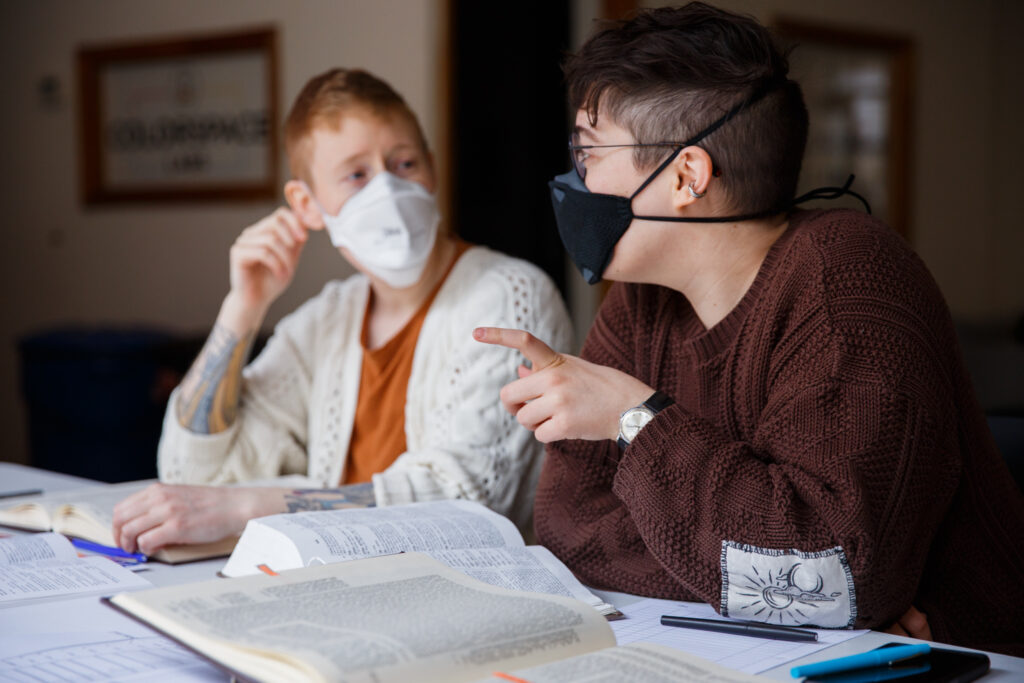I went on a whirlwind road trip recently to Los Angeles. Long story abbreviated: 50 years ago, in a universe far, far away, I was a scrappy but nerdy poor kid who landed in the storied classroom of the illustrious Ms. Kahn, my proto-SVARA, Junior High English teacher. The school was a red-hot socio-economic mess, where “underprivileged” kids of every color collided with well-off kids on the lighter end of the pantone spectrum.
On paper, Mark Twain Jr. High School exhibited the gold standard of diversity, and so became the model for the entire L.A. unified school district. However, there was no attempt made by the adults in charge to grease the wheels of integration. So, from roughly 8am-3pm, we inhabited a hormone-driven dystopia. The campus was divided into territories determined by skin tone, height, weight, gender, intelligence, dress, hairstyle, socio-economic background, and degree of jockdom. If you didn’t fit into an established pack, you would be wise to do your best to blend into the background, lest you be singled out for abuse. Those of us who were outliers scurried from class to class with purpose and haste and ate inside the cafeteria, which was a neutral zone. Disregarding the implied borders led to explosive confrontations.
Except in Ms. Kahn’s class, where we were able to drop our guard and luxuriate in her command with no regard to our creed, ethnicity, or class. She gave us tools to release the power of precise language, she demonstrated the value of knowing oneself, and she emphasized the importance of not taking other people’s messes personally all the while attending to our own foibles responsibly and with grace. She taught us that books were far more than repositories of entertaining stories, and she coached us to comb and plumb each text for its history, wisdom, and survival hacks. She insisted that we expand our expressive glossary and to approach our weekly vocabulary lists with the same curiosity that we held for our latest crush. We read great works and edgy novels, explored the mysteries of grammar, and discovered the origins and backstories of multisyllabic words that we wielded like broadswords in our essays. She opened a lifesaving skill for me, and I’m happy to say that we became and have stayed friends for a half-century.
One of my classmates, Janet, also a Ms. Kahn devotee, lives near me. At our treasured pedagogue’s request, we packed up and took off for a 3D visit in LA with her. A great time was had by all, the highlight being a walking tour of our once run-down and decrepit hometown, Venice Beach, where Janet and I regaled Ms. Kahn with stories of surviving childhood and adolescent misdeeds. Along the way, I took a selfie of the three of us. I showed it to a friend when I got home, who asked, “Wait, which one is the teacher?”
Ms. Kahn is, was, and always will be, a firm believer in the power found in looking, acting, and feeling one’s best. In her case that means elegant bling, well-fitting timeless fashion, excellent posture, intelligent irreverence, laser-focused honesty, and a light dusting of class and sass. She encouraged her academic progeny to be true to ourselves in body and mind; to manifest our truth into the world; and to toss our heads and walk away from those who would degrade, denounce, or debase us. In these matters, Janet and I have been solid A students since 1972.
Due to a wildfire-induced freeway closure, Janet and I had to take a detour which extended our return trip from a 6-hour journey into a 13-hour slog. I woke up the next morning, bleary, daunted by the stack of work awaiting my attention, and a bit dyspeptic and puffy from my indiscriminate consumption of salty snacks and carbonated beverages while driving. I caught a glimpse of myself in the mirror, and it was not pretty. I stood there staring at myself—on the one hand so happy to have spent a few days with our teacher, feeling that Janet and I had shown up for someone we loved in a meaningful way. For a few days I knew, without a doubt, that my presence was important, my history noble, my survival inspiring. With Ms. Khan as my witness, and with Janet as a fellow traveler, I was able to “meet the world with my scars, not my wounds” as Father Greg Boyle describes living well despite knowing trauma. And on the other hand, staring back at me from the mirror, I could see lingering stress and doubt in my face, tension and malaise in my body, and I was confronted with a stagnation that feels like my daily bread. The mirror did nothing to hide the bags under my bespectacled eyes, or spare me from reckoning with my brow permanently furrowed from the last several years of wondering, “What the hell am I doing with my life?”
A mirror can be a treacherous instrument. Deceptively simple—a sheet of clear glass backed by an impossibly smooth layer of reflective metal—light strikes a mirror and it bounces an exact image back to its source. When we stand before a looking glass we are immediately confronted by our own light.
We are, each of us, a fleshy reflection of the Mystery out of which we were forged. In human terms we are foggy mirrors, hazily reverberating with the traits and talents, attitudes and angles, colors and curves of our human parents—but customized by the unique genetic instructions we inherit. Our parents’ DNA assures that we maintain a discernable connection, iteration, and permutation of those who came before us, while establishing a singular position for us in the tapestry of humanity. It can be troubling or comforting to accept that we are tied to our forebears, but at least it is tangible. Our connection to the Divine, however, is harder to trace, confirm, and endure.
וַיּבְרָא אֱלֹהִים אֶת-הָאָדָם בְּצַלְמוֹ בְּצֶלֶם אֱלֹהִים בָּרָא אֹתו… (בְּרֵאשִׁית א״כז)
And God created the Earthling in Its image, in Its image It created it…. (Genesis 1:27)
Scripture, with this reflexive statement, insists that every human is a glittering reflection of the creativity and destruction, jealousy and love, violence and peace, beginning and end, kaleidoscopic Oneness loosely referred to as “God”. But how do we reckon with such a grand assertion? How do we, bone and blood beings, live gracefully knowing that we are here to be God’s reflection made material? What does it even mean to be created in God’s image?
וַיֹּאמֶר מֹשֶׁה אֶל־הָאֱלֹהִים הִנֵּה אָנֹכִי בָא אֶל־בְּנֵי יִשְׂרָאֵל וְאָמַרְתִּי לָהֶם אֱלֹהֵי אֲבוֹתֵיכֶם שְׁלָחַנִי אֲלֵיכֶם וְאָמְרוּ־לִי מַה־שְּׁמוֹ מָה אֹמַר אֲלֵהֶם׃ וַיֹּאמֶר אֱלֹהִים אֶל־מֹשֶׁה אֶהְיֶה אֲשֶׁר אֶהְיֶה וַיֹּאמֶר כֹּה תֹאמַר לִבְנֵי יִשְׂרָאֵל אֶהְיֶה שְׁלָחַנִי אֲלֵיכֶם׃ (שׁמות ג״יג-יד)
Moses said to The Powers, “When I come to the children of Yisrael and I say to them, ‘The God of your ancestors sent me to you’ and they say to me ‘What is God’s name?’ what do I say to them?” And The Powers said to Moses, “I Will Be What I Will Be. Tell those God Wrestling children, ‘I-Will-Be sent me to you.’ ” (Exodus 3:13-14)
God is the changing, ever becoming, constantly unfolding reality that manifests through us and all around us. We might not guess it, being spirit beings who temporarily inhabit skin/muscle/organ/bone/blood bodies, but birth and death are merely pathways for energy to flow into and out of this life. In moments of spiritual clarity—when I am confident that I really am a God glimmer, aware that creation and destruction are inextricably linked; chaos and order are just two ways of being in relationship; time is just a way of ordering existence; pain and pleasure are just two hints that I’m still alive—I am at peace. My anxiety falls away and I am happy being a singular, glittery, grain of sand on a great big beach.
I love all this floaty, trippy, mystical stuff. And I have certainly fantasized about being calmly detached from pain, sitting Buddha-like in the face of danger, impartial and selfless. I dream about being so filled with equanimity that I could blithely giggle every time someone I love leaves the planet rather than finding myself lost and crushed by their absence. What I wouldn’t trade for the capacity to embrace existence without constantly raging at the world’s manifold injustices! Would that I had already mastered the art of sleeping soundly on a roiling sea of loneliness and failure! Inhale. To be a shelter in the storm. Exhale. But, so far, with only occasional glimpses of tranquility, that ain’t what this life has been for me. Sigh. And I don’t think it was happening for the rabbis of antiquity either but, to paraphrase Rabbi Tarfon, neither were they free to walk away from that promise. (Pirke Avot 2:16)
In their wisdom, our sages and scholars, fishmongers and housewives, bandits and bards, vintners and harlots, recognized that being “created as the image of God” was a tough card to pull. And so, they left us with multiple pathways and processes for staying out of our own gutters. Foremost among their spiritual technologies is holy wobbling, or to use proper rabbinic Hebrew, t’shuvah.
מִיתָה וְיוֹם הַכִּפּוּרִים מְכַפְּרִין עִם הַתְּשׁוּבָה. הַתְּשׁוּבָה מְכַפֶּרֶת עַל עֲבֵרוֹת קַלּוֹת עַל עֲשֵׂה וְעַל לֹא תַעֲשֶׂה. וְעַל הַחֲמוּרוֹת הִיא תוֹלָה עַד שֶׁיָּבֹא יוֹם הַכִּפּוּרִים וִיכַפֵּר: (משנה יומא ח”ח)
Death and Yom Kippur atone (for misdeeds when in combination) with t’shuvah. T’shuvah by itself atones minor transgressions for positive and negative mitzvot, and for severe misdeeds it suspends (repercussions) until Yom Kippur (which completes the atonement). (Mishnah Yoma 8:8)
The word t’shuvah derives from the root ש-ו-ב, which connotes return, restoration, repetition, reply, refutation, and repentance. Thus, in the rabbinic mind the remedy for wrongdoing is course correction and communal restoration rather than punishment. How the heck did they come up with such an idea? I wish it weren’t true, but my instincts are to hide in shame when I’ve erred, and/or to shame others when I’ve been erred upon. In the rough ‘n tumble culture of my childhood, the proper response to being crossed was to inflict pain and inspire fear in one’s adversaries. The rabbis who “made this (t’shuvah) shit up” were plenty familiar with the same violence and intimidation I experienced as a kid, and yet, they knew something I hadn’t figured out yet—they knew that we are merely reflections of a messy, jealous, loving, irascible, patient, funny, scary, terrible, life-giving, murderous, wonderful God. And they recognized that as funky, flawed, and finite human beings, we have some agency over what aspects of God we reflect.
God is Oneness—It has no choice about that. Birthing, building, and blowing up entire universes are just another set of endless tasks on God’s to-do-for-all-eternity check list. And while human beings have that same destructive and creative energy flowing through us, unlike God we have filters. Our challenge is to choose life and blessing even when fury and revenge are offering us a more satisfying deal. The rabbis, who were tossed and tussled every which way by the Syrians, Greeks, Romans, Spaniards, Germans, you name it, for as long as they have been a thing, figured out how to keep us from driving off the road in a storm. They set up speed bumps, guard rails, and caution signs to ensure that we would slow down and steer back onto the spiritual tarmac of decency and forgiveness. And they did it by using the only tools they could count on: words and action.
The Jewish people are called Yisrael, the God Wrestlers. The High Holy Days, which are rapidly approaching, invite us to grapple with the God-like power to hurt and ruin that is invested in us. The rabbis invented a ritual in which we might strive to subdue our tendency to cause pain and suffering; work to mitigate our capacity to damage and demean; and to expand our capacity for forgiveness, and reparation. The rabbis had faith that we could temper our Godishness by simply being decent human beings. They encourage us to use t’shuvah to wrestle that sacred fire back into the soft recess of our skin and muscle, daring us to offer our hands and hearts for healing and pleasure, raising our voices in song and supplication, listening to each other with empathy and curiosity, and staying mindful that we are only here, in this unique form, for the weekend. They were storytellers and wordsmiths, fully aware that these were our most uniquely human ways of shimmering, mirroring, and reflecting our Divine source.
I zoomed with Ms. Kahn shortly after the big road trip. We chit-chatted, reviewed the visit, and talked about the upcoming High Holy Days. She has been attending the Rosh Hashanah and Yom Kippur services I’ve led for the past many years. This is the first year I will not be on the bima, not giving a drash, not holding any congregational reins. We commiserated that neither of us know where we are going to spend the holidays this year. She insists that I am her rabbi. I balk and tell her that she was my first rabbi. She balks. The exchange is pretty funny because we are both persnickety about linguistic precision, and of course, neither of us are, in fact, rabbis, in the modern sense.
The older I get, the more I feel time speeding by. So, in the spirit of Elul, I told my adored teacher, once again, just for good measure, that I love and admire her every bit as much now as when I was a tender, shivering, smart, but so very lost 12-year-old who, by some great grace, stumbled into the safe haven of her classroom for the first time. When I think about my best work, my clearest purpose, and those glorious moments when some spark of my own brilliance lit up someone who was lost or struggling, it always comes back to the skills I learned from Ms. Khan, be they those of wordcraft or self-respect. , “Honestly Ms. Kahn,” (yes, I still call her Ms. Kahn, but she doesn’t seem to mind) “you taught me, both by example and the gathering of intellectual acumen, how to navigate my messy life with aplomb and even find some value in it for myself and others. You pointed me in the direction of my strengths, you unlocked doors in my brain, and well, I don’t think it is too hyperbolic to say that your tutelage was a lifeline for me, and I know I’m not alone in that sentiment.” And then, like a great Rav does, she paraphrased a text that we both love: Page 217 from The Sirens of Titan by Kurt Vonnegut. “Well, Jhos, in the classroom, I found a place where I could do good without doing any harm, or at least not much. I was your teacher, but now you are my rebbe.” And as she said it, I swear I saw a glint of God flash across the screen.







